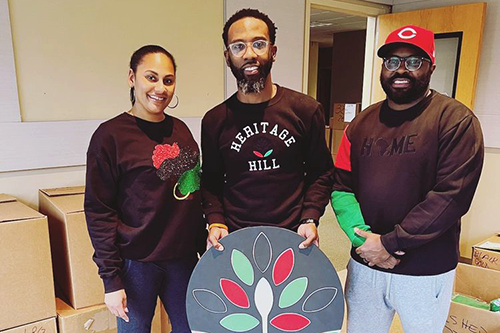
Heritage Hill finished transitioning to the co-op business structure in February. Currently the co-op has three worker-owners, with two people interested in joining.The transition was seamless. “Co-op Cincy has been very helpful,” Brandon said. “They came with a ready-made template.”Brandon said that, in addition to growing, Heritage Hill wants to develop some form of business academy. “We want people to be familiar with business ownership and what that looks like.”Heritage Hill joins a wave of existing businesses transitioning to the co-op business model. In January, Shine Nurture Center, a childcare center in Mount Airy, became worker-owned.Ellen Vera, director of development and co-op organizing at Co-op Cincy, said, “We are so excited about helping businesses like Heritage Hill transition to worker ownership.”“As a fast growing startup, the founder and owner wanted to broaden ownership so that Heritage Hill could more fully fulfill its mission to lift up the Black community. Converting to a democratic ownership model allows more workers to benefit from the success of the company, while tapping into everyone’s full potential.”Co-op Cincy is working to support more transitions, in addition to helping launch new co-op businesses. Since starting a loan fund with Seed Commons in 2018, Co-op Cincy has loaned $691,000 to co-op businesses.Earlier this month, Queen Mother’s Market (QMM) cooperative held a launch party and fundraiser.QMM is working to start a Black, women-led grocery cooperative store in Walnut Hills, a food desert. A Kroger store closed in the neighborhood in 2017. The full-service grocery store will focus on affordable, healthy foods.QMM is one of the emerging co-ops in Co-op Cincy’s network and will be owned by the Walnut Hills community and its employees.Co-op Cincy and the Business Legacy Fund partner with the Cincinnati USA Regional Chamber’s Minority Business Accelerator, the African-American Chamber of Greater Cincinnati-Northern Kentucky, the Greater Cincinnati Microenterprise Initiative, All-In-Cincinnati, and Xavier Leadership Center. The Business Legacy Fund is funded through the support of the Carol Ann and Ralph V. Haile, Jr. Foundation, the Greater Cincinnati Foundation, the Fifth Third Foundation, and PNC Bank.


